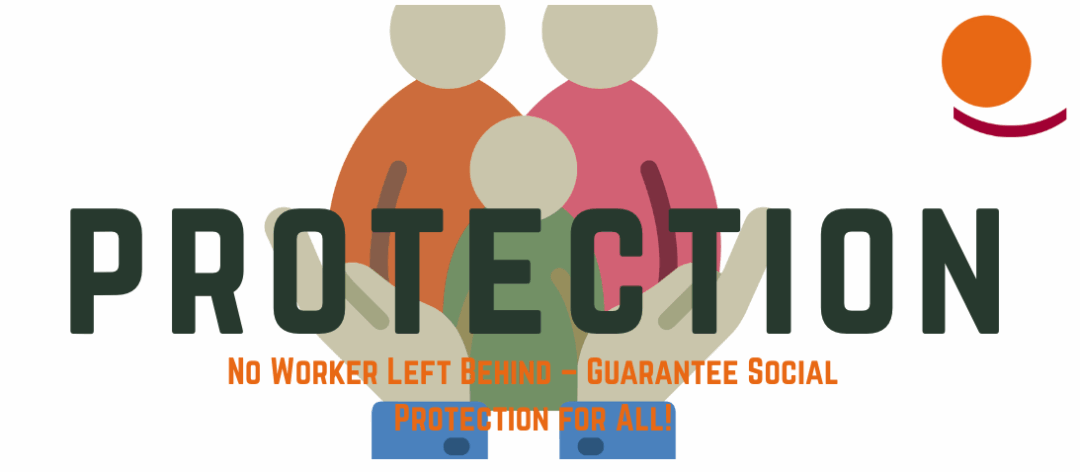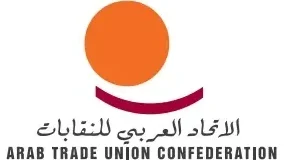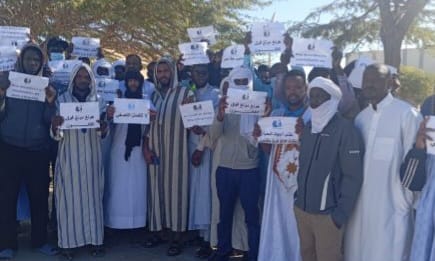
Promoting Comprehensive Social Protection and Occupational Safety and Health in the Arab Region
The Arab Trade Union Confederation (ATUC) – representing over 5 million workers across 11 Arab countries – is committed to advancing comprehensive social protection and occupational safety and health (OSH) for all workers in the Arab region. This vision aligns with the international call for a New Social Contract that rebuilds trust between workers, governments, and businesses. Such a New Social Contract is founded on respect for workers’ rights, the creation of decent jobs (including climate-friendly jobs), living wages, universal social protection, equality, and inclusion in decision-making. These principles echo global development agendas, including the Sustainable Development Goals (notably target 1.3 on social protection and 8.8 on safe workplaces), underlining that social protection and safe working conditions are fundamental to decent work and human dignity. Globally, the need for action is clear. Despite the world being wealthier than ever, vast numbers of people still lack basic labor protections. Over 4 billion people worldwide have no social protection coverage at all – roughly half the global population. In the Arab States region, only about 40% of the population is covered by at least one social protection benefit, leaving a majority unprotected against life’s risks. Critical social benefits reach only a minority; for instance, less than one in five unemployed workers globally receives unemployment benefits, and just one in three persons with disabilities worldwide receives disability benefits. At the same time, work remains dangerous for too many: each year an estimated 2.93 million workers die from work-related accidents or diseases, and hundreds of millions suffer non-fatal injuries.
Recognizing this crisis, the International Labour Organization (ILO) recently affirmed that “a safe and healthy working environment is a fundamental principle and right at work”. These sobering statistics underscore the urgency of ATUC’s mission to improve social protection and OSH standards in the Arab region.
Strengthening Trade Unions and Collective Bargaining
Empowering trade unions is a cornerstone of ATUC’s strategy for achieving decent work. Strong, independent unions give workers a voice to demand fair treatment. ATUC and its member organizations focus on bolstering the role of unions in collective bargaining with employers and government institutions. Through robust collective negotiations, unions can secure better wages, reasonable working hours, and safer working conditions for employees. Indeed, collective bargaining is crucial for addressing the “inequality by design” in today’s economies. (Notably, 79% of countries worldwide have recorded violations of the right to collective bargaining, reflecting the challenges unions face globally in defending workers’ rights.) In this context, ATUC works to reinforce the institutional power of Arab trade unions so that they can more effectively negotiate and uphold labor standards. By presenting a unified front, Arab unions can push for the enforcement of labor laws, the ratification of ILO conventions, and the inclusion of worker protections in employer policies. Strengthening unions also means improving their internal capacity and democratic governance – ensuring they truly represent workers’ interests across different sectors, including vulnerable groups like migrant and informal workers. Ultimately, a stronger trade union movement in the Arab region leads to more balanced labor relations, where workers can freely exercise their right to organize and collectively shape workplace conditions in line with international norms.
Education, Awareness, and Worker Empowerment
An informed worker is an empowered worker. ATUC supports its member unions in conducting wide-ranging education and awareness-raising programs so that workers understand their rights and how to claim them. These educational initiatives cover topics such as labor rights under national law, the proper use of safety equipment, entitlement to social security benefits, and procedures to report labor violations. By increasing awareness, ATUC aims to arm workers with knowledge that can prevent abuses and accidents before they occur. For example, when workers are aware of safety protocols and the right to refuse unsafe work, workplaces become safer. Likewise, understanding social protection programs (like pensions, health insurance, unemployment benefits, and maternity protections) helps workers demand enrollment and coverage. In many Arab countries, large portions of the workforce are in the informal economy or are migrant workers who may not be familiar with their legal rights. Targeted awareness campaigns – including workshops, training sessions, and informational materials in local languages – help these workers learn about registration for social insurance, the importance of contributing to pension schemes, and avenues for legal recourse if rights are denied. Empowerment through knowledge also fosters a culture of prevention and accountability: when workers know what standards to expect, they are more likely to report violations and partner with employers to fix hazards. ATUC’s emphasis on education is thus a proactive strategy to drive demand from the ground up for better social protection coverage and higher OSH standards. Over time, better-informed workers contribute to building a “safety culture” at work and a stronger social contract in society, wherein social protection and safe workplaces are seen as non-negotiable rights.
Advancing Universal Social Protection
Achieving universal social protection – meaning that all people have access to some form of social security throughout their lives – is a top priority for ATUC in the Arab region. Social protection includes essential guarantees like health care, income security for the elderly and persons with disabilities, unemployment support, paid maternity leave, and child allowances. Yet today the Arab region significantly lags in coverage and investment. On average, governments in Arab States spend only about 2.5% of GDP on social protection programs (excluding health care), a fraction of the global average.
This low investment contributes to glaring coverage gaps: as noted, roughly 60% of the region’s population lacks any social protection coverage, leaving millions of workers and their families extremely vulnerable. ATUC is responding by actively advocating for the expansion and reform of social protection systems across Arab countries. Through social dialogue and policy engagement, ATUC presses governments to adopt comprehensive social protection floors, in line with ILO Recommendation 202 on Social Protection Floors and other international standards. This means ensuring at least a basic level of social security for everyone – for example, basic income support for those in need and universal access to essential health care. ATUC member unions campaign for extending social insurance to informal economy workers, who often make up the majority of the labor force in Arab countries but are typically excluded from benefits. In recent years, some progress has been made: several countries introduced new cash transfer programs or unemployment assistance during the COVID-19 crisis, highlighting that change is possible. ATUC leverages these examples to call for permanent, law-based programs rather than temporary measures. A critical aspect of ATUC’s work is pushing for inclusive coverage – that is, covering women, young workers, migrant workers, and other marginalized groups who historically have lower social protection coverage.
For instance, ATUC emphasizes that social security systems should remove discriminatory barriers (such as those based on nationality or gender) so that migrant workers and women in all types of employment are covered on an equal footing. The Confederation also advocates for higher benefit adequacy. Currently, even those who are covered may receive only minimal benefits; ATUC argues for living pensions and adequate unemployment benefits that truly protect people from poverty. Through position papers, research, and direct negotiation, ATUC and its affiliates campaign for reforms such as lowering qualifying thresholds for pensions, increasing public pension budgets, and establishing unemployment insurance in countries where it is absent. These efforts are often carried out in cooperation with international partners – for example, ATUC aligns with the International Trade Union Confederation’s global call for universal social protection as part of the New Social Contract. By championing stronger social protection, ATUC seeks to ensure that every worker in the Arab region can count on basic income security and health care across their lifespan, thereby reducing poverty and inequality.
Promoting Occupational Safety and Health
Safe and healthy working conditions are fundamental human rights for workers. ATUC is dedicated to promoting higher occupational safety and health standards throughout the Arab region, recognizing that no worker should risk life or well being simply by going to work. The importance of this mission is underscored by global data: each year, nearly 3 million workers die due to work-related accidents or diseases, and about 395 million suffer non-fatal occupational injuries worldwide.
In June 2022, the International Labour Conference formally added the right to a safe and healthy working environment to the ILO’s fundamental principles and rights at work, elevating OSH to the same importance as freedom of association or the elimination of forced labor. ATUC embraces this development and works to translate it into concrete improvements on the ground in Arab countries. A major focus for ATUC is advocating for stronger national OSH laws and enforcement. Many Arab states have room to strengthen their labor codes with respect to safety, or to extend coverage to sectors like agriculture and domestic work which often lack OSH protections. ATUC member unions lobby for the ratification of key ILO OSH conventions (such as Convention 155 on Occupational Safety and Health and Convention 187 on the promotional framework for OSH) and for the implementation of national OSH policies in line with those standards. This includes pressing governments to hire and train more labor inspectors, establish national OSH committees (with worker representation), and impose meaningful penalties on employers who violate safety regulations. Through collective bargaining, unions also negotiate workplace-specific health and safety measures – from the provision of personal protective equipment to the establishment of joint worker-management safety committees that can identify and remedy hazards on site. Training and awareness are equally vital in preventing workplace accidents. ATUC supports initiatives to train worker representatives as safety officers who can monitor conditions and report dangers. Unions under ATUC’s umbrella conduct workshops on topics like hazard recognition, safe handling of machinery and chemicals, and workers’ rights to refuse unsafe work. These efforts help build a culture of prevention at the enterprise level. ATUC also runs campaigns for specific issues such as heat stress (an increasing concern in Gulf countries’ outdoor worksites) and construction safety, sectors where many migrant workers are employed.
In fact, migrant workers often face disproportionate risks: for example, in Saudi Arabia the incidence of occupational injuries among migrant workers was found to be four times higher than that of native workers. Such disparities highlight the need to extend OSH protections to all workers without discrimination, regardless of nationality or employment status – a principle ATUC strongly upholds.
Furthermore, ATUC engages with employers and authorities to promote better occupational health services, including regular health check-ups for workers, mental health support, and rehabilitation programs for injured workers. Especially after crises like the COVID-19 pandemic, there is a greater recognition of the need for resilient health and safety systems at work. ATUC leverages this awareness to push for lasting improvements (e.g., improved ventilation and hygiene standards in workplaces, and preparedness plans for future pandemics or emergencies). By championing OSH, the Arab Trade Union Confederation aims not only to reduce the grim toll of workplace accidents and illnesses, but also to ensure that every worker returns home safely at the end of the day. Safe workplaces are a core component of decent work, and they contribute to higher productivity and sustainable development.
Participatory Social Dialogue and Policy Influence
ATUC’s approach is grounded in the belief that workers must have a seat at the table when policies are made. To that end, the Confederation plays a proactive role in social dialogue at both national and regional levels. Social dialogue – the process of negotiation and consultation between governments, employers, and workers’ representatives – is essential for crafting labor and social policies that are fair and effective. ATUC facilitates the participation of its member unions in tripartite forums, such as national labor advisory councils or social security reform committees. By doing so, it ensures that the voices of workers are heard in decisions on issues like minimum wage setting, labor law reforms, or the design of new social protection programs. At the regional level, ATUC collaborates with bodies like the Arab Labour Organization (ALO) and engages in dialogues that span multiple countries, recognizing that many challenges (unemployment, migrant worker rights, social protection gaps) have a cross-border dimension in the Arab world. Through position papers and advocacy campaigns, ATUC presents unified trade union positions on these issues. For instance, ATUC has contributed to policy discussions on extending social protection to migrant workers (a significant issue given the large migrant workforce in some Arab states) and on harmonizing occupational safety standards across the region. These contributions often draw on international labor standards and best practices, helping to align Arab labor policies with global norms. In its policy advocacy, ATUC emphasizes inclusivity and equity. This means urging governments to adopt policies that leave no one behind – whether it is ensuring that refugees and non-citizens can access social insurance, or that labor laws cover domestic and gig economy workers who are often excluded. The confederation also stresses gender-responsive policies, such as stronger anti-discrimination laws and family-friendly workplace policies (e.g. parental leave and childcare support) to improve women’s participation in the workforce. Notably, women’s labor force participation in the Middle East and North Africa is the lowest in the world (around 19% versus 48% globally), a gap that cannot be closed without deliberate policy action to remove barriers and bias. Trade unions under ATUC are pushing for such action, advocating for enforcement of equal opportunity laws and the implementation of ILO Convention 190 on eliminating violence and harassment in the workplace, among other measures. By engaging constructively in dialogue with governments and employers, ATUC helps shape labor market reforms that are socially just. A key example is its advocacy for inclusive social protection strategies post-COVID-19, where ATUC has argued for permanent social safety nets building on the emergency responses many countries adopted during the pandemic. The confederation’s ability to mobilize worker input lends credibility and urgency to these discussions. When unions bring case studies of real worker experiences – such as factory safety incidents or struggles of informal workers without health coverage – it humanizes policy debates and underlines the stakes of reform. ATUC’s participatory approach thus improves the quality of policymaking: policies designed with worker involvement tend to be more robust, better implemented, and more in line with international commitments (like the UN’s 2030 Agenda for Sustainable Development and ILO conventions).
Equality, Non-Discrimination, and Social Justice
Underlying all of ATUC’s efforts is a profound commitment to equality and non-discrimination in the world of work. The Arab Trade Union Confederation recognizes that labor rights must apply to all workers – women and men, young and old, national and migrant, formal and informal – without distinction. Discrimination based on gender, nationality, age, ethnicity, or any other status not only violates fundamental rights, it also undermines economic development and social cohesion. ATUC therefore strives to eliminate all forms of workplace discrimination and to promote inclusive practices that give every worker a fair chance and decent working conditions. One major concern is the gender gap in employment and pay. Women in the Arab region face multiple barriers to equal participation in the labor market, from legal inequalities to cultural norms and care responsibilities. As noted, women’s labor force participation is around 18–19% in the region – the lowest rate globally – and women who do work often earn less than men for work of equal value. ATUC tackles these issues by supporting its member unions’ women’s committees and campaigns for gender equality at work. This includes advocating for laws that guarantee equal pay for equal work, prohibit gender discrimination in hiring and promotions, and provide maternity protection and childcare support. ATUC also raises awareness about gender-based violence and harassment in workplaces, encouraging the adoption of preventive policies and reporting mechanisms in line with international standards (such as ILO Convention 190). By empowering more women to take leadership roles within trade unions themselves, ATUC ensures that women workers’ voices and concerns are reflected in the union agenda. Another priority is protecting the rights of migrant workers, who are a significant part of the labor force in several Arab countries. Migrant workers often face not only harsher working conditions (as seen in the disproportionate injury rates) but also exclusion from social insurance and denial of the right to organize. ATUC works with international trade union partners and through bilateral agreements to defend migrant workers’ rights – for example, by calling for the portability of social security benefits across borders and the abolition of the kafala (sponsorship) system where it is still in place. Ensuring migrants have equal access to justice and to health and safety protections is an essential part of ATUC’s equality agenda. Furthermore, ATUC addresses discrimination related to age and employment status. Young workers in the Arab region suffer from very high unemployment rates and often end up in precarious, informal jobs with no security. ATUC advocates for youth employment programs and for including young workers in social security systems from the start of their careers. Similarly, ATUC pushes for the inclusion of informal sector workers (many of whom are self-employed or in micro-enterprises) in labor protections – through mechanisms like simplified registration for social security or extending labor law coverage to all workers regardless of contract type. The principle is that basic rights – to a fair wage, to a safe workplace, to social protection – should not depend on whether one has a permanent contract or works part-time, on the street, or online. In combating all these forms of inequality, ATUC sees trade unions as agents of social cohesion and justice. Unions can unite workers across different backgrounds and amplify the voices of the most vulnerable. For instance, by organizing domestic workers or agricultural day laborers (sectors often ignored), unions help bring those marginalized groups into the fold of labor protections. By advocating policies like progressive taxation to fund social services, or public investments in job creation, the trade union movement contributes to a fairer distribution of wealth and opportunities in society. ATUC frequently partners with other civil society organizations – such as women’s rights groups, youth organizations, and migrant community associations – to build broad coalitions in favor of equality and anti-discrimination measures.
The Arab Trade Union Confederation is championing a model of development in the Arab region that places social protection and occupational health and safety at its core. Through strengthening trade unions’ collective bargaining power, educating workers about their rights, pushing for universal social protection coverage, insisting on safer workplaces, engaging in dialogue-based policymaking, and upholding equality, ATUC works to ensure that no worker is left behind. These efforts are deeply rooted in the understanding that social protection and OSH are not optional benefits or privileges, but fundamental human rights integral to the concept of decent work. By advocating for comprehensive social protection systems, ATUC aims to guarantee that all workers and their families can live with security and dignity – protected against poverty, illness, and uncertainty. By promoting rigorous OSH standards, ATUC seeks to create working environments where every worker’s life and health are safeguarded. This dual focus not only improves individual lives but also has wider socio-economic benefits: social protection and safe workplaces increase productivity, support social stability, and enable sustainable economic growth. They are key ingredients in building inclusive societies and resilient economies. ATUC’s mission resonates with international frameworks and the aspirations of the global labor movement. It affirms the call for a New Social Contract at the global level – one that rebuilds trust by guaranteeing all workers their fair share of economic progress and a voice in shaping their working conditions.




